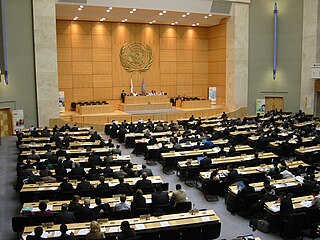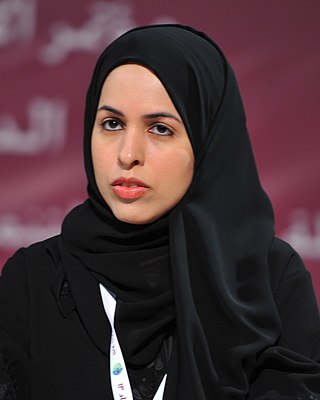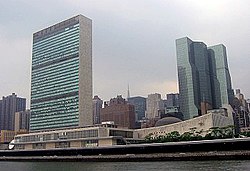
Kofi Atta Annan was a Ghanaian diplomat who served as the seventh secretary-general of the United Nations from 1997 to 2006. Annan and the UN were the co-recipients of the 2001 Nobel Peace Prize. He was the founder and chairman of the Kofi Annan Foundation, as well as chairman of The Elders, an international organisation founded by Nelson Mandela.
Territorial integrity is the principle under international law where sovereign states have a right to defend their borders and all territory in them from another state. It is enshrined in Article 2(4) of the UN Charter and has been recognized as customary international law. Under this principle, forcible imposition of a border change is an act of aggression.

The United Nations General Assembly is one of the six principal organs of the United Nations (UN), serving as its main deliberative, policymaking, and representative organ. Currently in its 79th session, its powers, composition, functions, and procedures are set out in Chapter IV of the United Nations Charter.

The World Summit on the Information Society (WSIS) was a two-phase United Nations-sponsored summit on information, communication and, in broad terms, the information society that took place in 2003 in Geneva and in 2005 in Tunis. WSIS Forums have taken place periodically since then. One of the Summit's chief aims is to bridge the global digital divide separating rich countries from poor countries by increasing internet accessibility in the developing world. The conferences established 17 May as World Information Society Day.
Issues relating to the State of Israel and aspects of the Arab–Israeli conflict, and more recently the Iran–Israel conflict, occupy repeated annual debate times, resolutions and resources at the United Nations. Since its founding in 1948, the United Nations Security Council, has adopted 79 resolutions directly related to the Arab–Israeli conflict as of January 2010.

On 8 September 2000, following a three-day Millennium Summit of world leaders gathered in New York at the headquarters of the United Nations, the UN General Assembly adopted some 60 goals regarding peace; development; environment; human rights; the vulnerable, hungry, and poor; Africa; and the United Nations which is called Millennium Declaration . A follow-up outcome of the resolution was passed by the General Assembly on 14 December 2000 to guide its implementation. Progress on implementation of the Declaration was reviewed at the 2005 World Summit of leaders. The Declaration includes 8 chapters and 32 paragraphs.
The United Nations Democracy Fund (UNDEF) was created by UN Secretary-General Kofi A. Annan in 2005 as a United Nations General Trust Fund to support democratization efforts around the world. It was welcomed by the General Assembly in the Outcome Document of the 2005 World Summit and was created by the UN Secretary- General.

United Nations Security Council Resolution 1564, adopted on 18 September 2004, after recalling resolutions 1502 (2003), 1547 (2004) and 1556 (2004), the Council threatened the imposition of sanctions against Sudan if it failed to comply with its obligations on Darfur, and an international inquiry was established to investigate violations of human rights in the region.
Non-interventionism or non-intervention is commonly understood as “a foreign policy of political or military non-involvement in foreign relations or in other countries’ internal affairs”. This is based on the grounds that a state should not interfere in the internal politics of another state as well as the principles of state sovereignty and self-determination. A similar phrase is "strategic independence".
The responsibility to protect is a global political commitment which was endorsed by the United Nations General Assembly at the 2005 World Summit in order to address its four key concerns to prevent genocide, war crimes, ethnic cleansing and crimes against humanity. The doctrine is regarded as a unanimous and well-established international norm over the past two decades.

The United States is not a state party to the Rome Statute of the International Criminal Court, which founded the International Criminal Court (ICC) in 2002.

United Nations Security Council Resolution 1674, adopted unanimously on April 28, 2006, after reaffirming resolutions 1265 (1999) and 1296 (2000) concerning the protection of civilians in armed conflict and Resolution 1631 (2005) on co-operation between the United Nations and regional organisations, the Council stressed a comprehensive approach to the prevention of armed conflict and its recurrence.

The Millennium Summit was a meeting among many world leaders, lasting three days from 6 to 8 September 2000, held at the United Nations headquarters in New York City. Its purpose was to discuss the role of the United Nations at the turn of the 21st century. At the meeting, world leaders ratified the United Nations Millennium Declaration. This meeting was the largest gathering of world leaders in history as of 2000. It was followed five years later by the World Summit, which took place from 14 to 16 September 2005.

The legality of the Iraq War is a contested topic that spans both domestic and international law. Political leaders in the US and the UK who supported the invasion of Iraq have claimed that the war was legal. However, legal experts and other world leaders have argued that the war lacked justification and violated the United Nations charter.

United Nations Security Council resolution 1318, adopted unanimously on 7 September 2000, after holding a meeting of world leaders on occasion of the Millennium Summit, the Council endorsed the United Nations Millennium Declaration on ensuring an effective role for the Security Council in the maintenance of international peace and security, particularly in Africa.
The responsibility to protect (R2P) is a widely endorsed and developing norm aimed at preventing humanitarian atrocities. China has been surprisingly receptive towards the development of R2P since its inception in 2001, despite China's traditional tendency to obstruct engagement in humanitarian crises. As veto-wielding Security Council member, important regional power, and major economic power, with interests in states experiencing, or vulnerable to, humanitarian crisis, including Nigeria, Zimbabwe, Angola and Sudan, the support of China for R2P is vital.

Zohrab Hrachiki Mnatsakanyan is an Armenian diplomat. Mnatsakanyan previously served as Minister of Foreign Affairs and Armenia's Permanent Representative to the United Nations.

The sixty-eighth session of the United Nations General Assembly opened on 17 September 2013. The president of the United Nations General Assembly was chosen from the GRULAC with Antigua and Barbuda's John William Ashe being the consensus candidate, thus bypassing the need for an election.

The Republic of Korea and the Democratic People's Republic of Korea were simultaneously admitted to the United Nations (UN) in 1991. On 8 August 1991, the UN Security Council passed Resolution 702, recommending both states to the General Assembly for membership. On 17 September 1991, the General Assembly admitted both countries under Resolution 46/1.

Sheikha Alya Ahmed Saif Al-Thani (Arabic: علياء بنت أحمد آل ثاني; is a Qatari diplomat who currently serves as the Permanent Representative of the State of Qatar to the United Nations.














